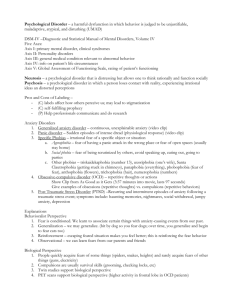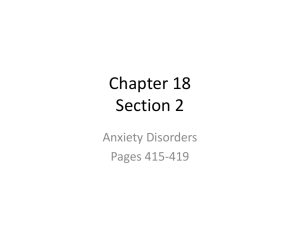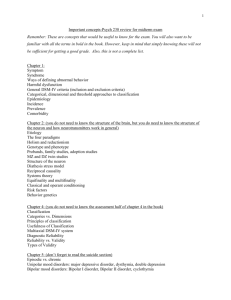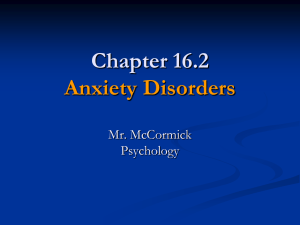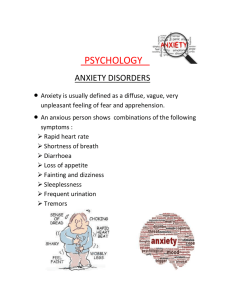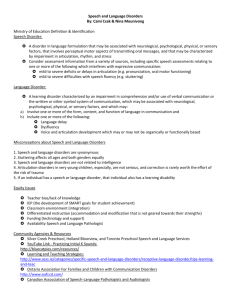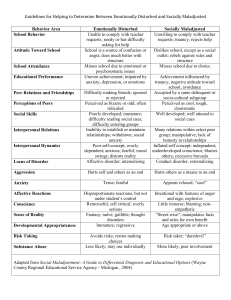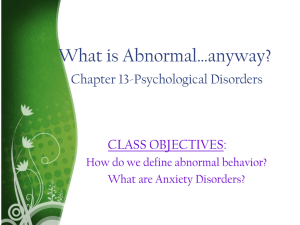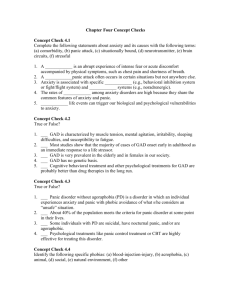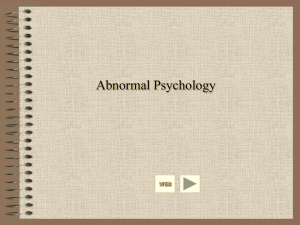Abnormal Psychology
advertisement
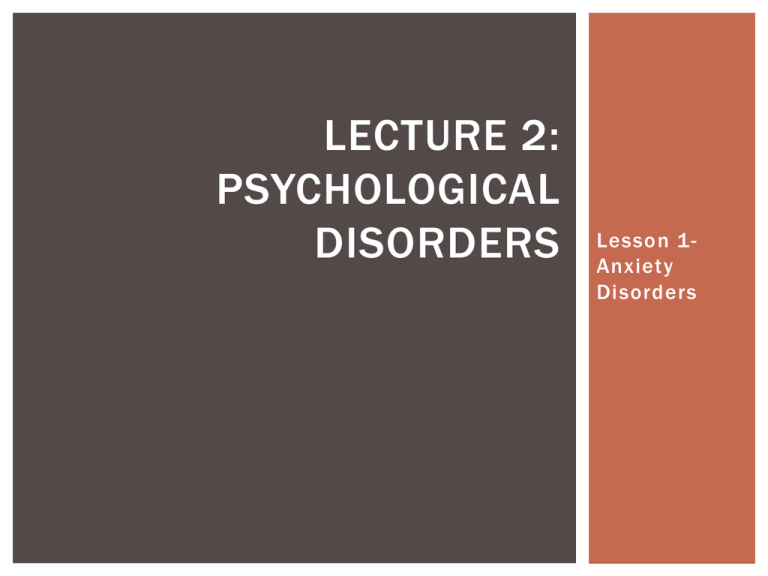
LECTURE 2: PSYCHOLOGICAL DISORDERS Lesson 1Anxiety Disorders ANXIET Y DISORDERS Are psychological disorders where the primary symptom is anxiety, or a feeling of impending doom or disaster from a specific or unknown source. Anxiety disorders are characterized by mood symptoms of tension or agitation; bodily symptoms of sweating or increased heart rate and blood pressure as well as cognitive symptoms such as worry or rumination (repetitively focusing on the symptoms or causes of distress). Anxiety disorders include panic disorder, generalized anxiety disorder, phobias, obsessive -compulsive disorder, and posttraumatic stress disorder. Panic Disorder DIAGNOSED AS… T h e ex p e r i e n c e o f r e p e a te d a t t a c k s o f i n te n s e a n x i et y accompanied by: s ev e r e c h e s t pain Tightness of m u s c le s Choking Sweating O r o t h e r a c u te s y m p to ms S y m p to m s c a n l a s t a ny w h e r e f r o m a f ew m i n utes to a c o u p le o f h o u r s Generalized Anxiety Disorder SIMILAR TO PANIC DISORDER HOWEVER, S y m p to m s m u s t o c c ur f o r a t least 6 months a n d i n c l ud e c h r o ni c a n x i et y n o t a s s o c i a te d w i t h a ny s p e c i fi c s i t ua t i o n o r o b j ec t T h e i n d i v i d ua l frequently ex p e r i e nc e s : Sleep problems Dif ficulty concentratin g Irritability Tenseness Being hypervigilant Phobias PHOBIAS ARE… I n te n s e , i r r a t io n a l f e a r r e s p o n s e s to s p e c i fi c s t i m ul i A fear turns i n to a p h o b i a when it p r o vo ke s a c o m p e l li n g , i r r a t io n a l d e s i r e to av o i d a dreaded s i t ua t i o n o r o b j ec t , d i s r up t i n g t h e person’s daily l i fe Nearly 5% of t h e p o p ula t i o n s u f fe r s f r o m some mild form of phobic disorder Obsessive-Compulsive Disorder (OCD) OCD IS A… Compound disorder of thought and b e h av i o r C h a r a c te r i z e d by o b s e s s i o n s and compulsions Obsessions are p e r s i s te n t , intrusive, & u nwa n t e d thoughts that a person cannot get out of their mind Compulsions are ritualistic b e h av i o r s performed r e p e a te d l y i n o r d e r to reduce the te n s i o n c r e a te d by t h e obsession Posttraumatic Stress Disorder (PTSD) PTSD IS A RESULT OF… Some trauma experienced (natural d i s a s te r, wa r, v i o l e n t c r i m e ) by the victim Tr a u m a i s r e experienced through realistic nightmares and flashbacks V i c t i m s m ay experience reduced i nv o l v e m e n t w i t h the outside wo r l d General arousal is also experienced c h a r a c te r i z e d by hy p e r a l e r t n e s s , guilt, and difficulty concentrating LEARNING AND BIOLOGICAL PERSPECTIVES OF ANXIET Y DISORDERS DEVELOPMENT Freud assumed that anxiety disorders are symptoms of submerged mental energy that derives from intolerable impulses that were repressed during childhood. Learning theorists, drawing on research in which rats are given unpredictable shocks, link general anxiety with classical conditioning of fear. Some fears arise from stimulus generalizations, such as when a person who fears heights after a fall also comes to fear planes. DEVELOPMENT CONTINUED… Through observational learning, someone might also learn fear by seeing others display their own fears. Research suggest humans might be biologically prepared to develop certain fears. Compulsive acts typically are exaggerations of behaviors that contributed to our species’ evolution. DEVELOPMENT CONTINUED… Research shows the anxiety response is genetically influenced PET scans of individuals with OCD reveal excessive activity in the region of the brain called the anterior cingulate cortex . Some anti-depressant drugs dampen fear -circuit activity in the amygdala, thus reducing OCD behavior. REFERENCES Maitland, L. L. (2003). Psychology: five steps to a 5 on the AP exam. New York: McGraw -Hill.
